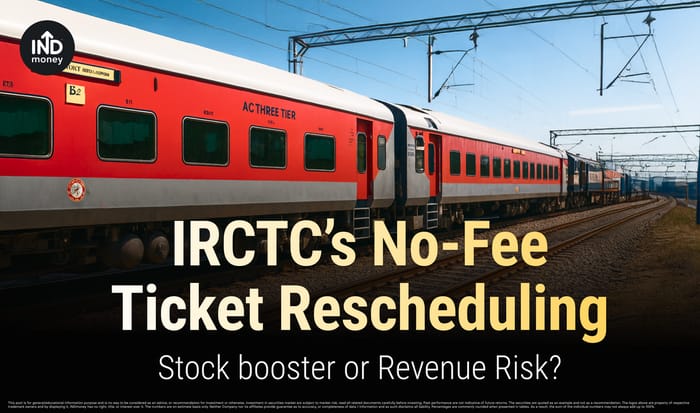
- The Policy Change
- Why Investors Should Care
- Potential Financial Impact of the New Policy
- Scale Matters
- Market Outlook: Three Scenarios
- Bottom Line
- Disclaimer
The Indian Railway Catering and Tourism Corporation (IRCTC) is rolling out one of the most passenger-friendly reforms in recent years, and investors are watching closely. The impact of this change on IRCTC’s business model and share price could be meaningful, depending on how the fine print plays out.
The Policy Change
On October 7, 2025, Union Railway Minister Ashwini Vaishnaw announced in an interview with NDTV that passengers will soon be allowed to reschedule confirmed train tickets online without paying a cancellation fee. The rollout is expected to begin from January 2026, and the move is aimed at making train travel more flexible for passengers. This announcement was picked up widely by major news and financial publications, highlighting its scale and potential operational impact.
Why Investors Should Care
IRCTC’s revenue engine has four key parts:
| Segment | Revenue (₹ Cr) | Share of FY25 Revenue |
| Catering | 2,125 | 45.5% |
| Internet Ticketing | 1,426 | 30.5% |
| Tourism | 745 | 16.0% |
| Rail Neer | 379 | 8.0% |
| Total | 4,676 | 100% |
Among these, Internet Ticketing is the high-margin workhorse, with EBITDA margins of over 80%. Even small changes in booking behaviour can ripple through IRCTC’s profitability.
Potential Financial Impact of the New Policy
1. Convenience Fee Volumes
Currently, if a passenger wants to change plans, they must cancel and book again, creating two transactions and two convenience fees. With the new rescheduling system, many of these will become single rescheduling events, possibly reducing booking transaction volumes. A few percentage points decline in transactions on ₹1,426 Cr of Internet Ticketing revenue could matter for margins, unless IRCTC introduces a nominal “rescheduling fee”, which has not been announced yet.
2. Passenger Retention and Cross-Sell
By removing friction, IRCTC can increase traveller stickiness. More users might stay within the IRCTC platform instead of abandoning travel, use e-catering or tourism add-ons more, or travel more often, especially in segments like AC Chair Car and Sleeper. This could offset revenue dips from ticketing and boost ancillary income.
3. Execution & Policy Details
The exact rules are yet to be notified. How many times can a ticket be rescheduled? How close to departure will changes be allowed? Will there be a flat or percentage rescheduling fee? Will it apply to all trains/classes or just confirmed e-tickets? These details will determine whether the impact is neutral, positive, or a mild drag on margins.
Scale Matters
IRCTC handled over 5,000 million tickets in FY25. Even a 2–3% behaviour shift across this massive base could move financials. For example, a 3% drop in transactions at ₹20 average convenience fee equals around ₹30 crore potential hit. But a 3% increase in tourism or catering attach rates could more than make up for this.
Market Outlook: Three Scenarios
| Scenario | Description | Likely Stock Impact |
| Base Case | Minor drop in convenience fees, offset by cross-sell gains | Neutral to mildly positive |
| Bull Case | Rescheduling fee introduced + better engagement | Positive sentiment + EPS tailwind |
| Bear Case | No fee, frequent reschedules, added tech costs | Mild margin pressure on Internet Ticketing |
Bottom Line
IRCTC’s new ticket rescheduling policy is a structural change to how India’s train ticketing works. While passenger experience clearly improves, the financial impact will depend on execution and policy design. For investors, this is not a panic signal, but a development worth tracking closely in FY26 results. If IRCTC manages to balance customer convenience with monetisation, the long-term effect could actually be positive for the stock.
Disclaimer
Investments in the securities market are subject to market risks, read all the related documents carefully before investing. The securities are quoted as an example and not as a recommendation.This is nowhere to be considered as an advice, recommendation or solicitation of offer to buy or sell or subscribe for securities. INDStocks SIP / Mini Save is a SIP feature that enables Customer(s) to save a fixed amount on a daily basis to invest in Indian Stock. INDstocks Private Limited (formerly known as INDmoney Private Limited) 616, Level 6, Suncity Success Tower, Sector 65, Gurugram, 122005, SEBI Stock Broking Registration No: INZ000305337, Trading and Clearing Member of NSE (90267, M70042) and BSE, BSE StarMF (6779), SEBI Depository Participant Reg. No. IN-DP-690-2022, Depository Participant ID: CDSL 12095500, Research Analyst Registration No. INH000018948 BSE RA Enlistment No. 6428. Refer https://indstocks.com/pricing?type=indian-stocks; https://www.indstocks.com/page/indian-stocks-sip-terms-and-condition for further details.